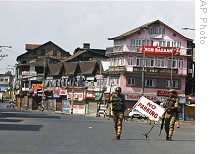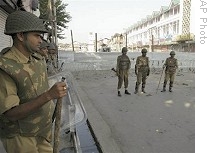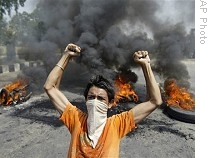VOA标准英语2008年-Communications Break Down in Kashmir
搜索关注在线英语听力室公众号:tingroom,领取免费英语资料大礼包。
(单词翻译)
For the Indian residents in the disputed state of Jammu and Kashmir it is becoming increasingly difficult to get timely information from local media about what is happening there. Amid large demonstrations1 calling for independence, unregistered local TV channels have been ordered not to broadcast news. The economic blockade and curfews have led to some newspapers ceasing publication. And, mobile phone messaging has been switched off, under government order, since the beginning of this month. VOA Correspondent Steve Herman has details from New Delhi. |
| Indian paramilitary soldiers carry a signboard to use it as a barricade2 during a curfew in Srinagar, 24 Aug 2008 |
Communications are becoming increasingly limited for the people of the disputed region of Indian Kashmir. Economic blockades and curfews have restricted movements of goods and people. More newspapers there shut down Monday, as staff could not reach their offices and publications are unable to circulate in the Kashmir Valley.
Unlicensed local cable television channels have been ordered to stop news broadcasts. They are accused of inflaming3 the public.
Text messaging on mobile phones has not worked since the beginning of the month.
India's Supreme4 Court has upheld a state ban on cell phone short messaging services, because they were allegedly being used to aggravate5 violence by spreading rumors6 about the ongoing7 protests.
But countering the rumors through local media is proving difficult.
The executive editor of the Kashmir Times in Jammu, Anuradha Bhasin Jamwal, says an economic blockade on the highway linking Jammu and Srinagar has taken its toll8 on the region's newspaper industry.
"It's more than a month that half a dozen newspapers have not hit the newsstands," he said. "A few bigger newspapers who could manage to get some materials are just surviving. They have cut down the pages. They have cut down the circulation. It's becoming extremely difficult to circulate the newspapers in the current situation in Kashmir Valley."
 |
| Indian paramilitary soldiers stand guard near barbed wires and tin wall set up as a barricade during curfew in Srinagar, 25 Aug 2008 |
For reporters who still have a viable9 outlet10, getting the story is increasingly risky11. Some of the journalists covering Sunday's protests in Srinagar were beaten by police, even though they were carrying passes allowing them to be on the streets during the curfew.
Sunday, authorities banned local unlicensed cable television channels from broadcasting news and public affairs programming. India's Jammu and Kashmir State government says the broadcasts reflect the views of extremists and inflame12 tensions between Muslims and Hindus.
Broadcast journalism13 professor S.R. Chari of the Indian Institute of Mass Communications says that was a correct regulatory decision.
"The government had given the freedom for them to go on, even without having been licensed," he said. "But, at this juncture14, they now feel those people could be restricted, which I think is fair enough for the government to say that since 'you are not registered' they are restricting those people."
Authorities in Srinagar in April ordered cable operators to stop relaying four popular TV channels from Pakistan.
There could be negative ramifications15 from the increasing communications restrictions16, according to Shahid Rasool, head of the Media Education Research Center at Kashmir University.
"That is going to create more problems in terms of the rumors that get spread," he said. "And, rumors travel very fast from mouth to mouth, one village [to] another village. That can really create difficulty for administration."
The professor says that has Kashmiris increasingly compelled to seek outside information sources in Hindi, Urdu and English.
"People will rely more on Pakistan radio and BBC and Voice of America," Rasool said. "In fact, myself, yesterday heard Voice of America's Urdu service to get what's happening in Kashmir."
The U.S. Broadcasting Board of Governors has announced that VOA's Hindi language radio one-hour daily broadcast will cease at the end of next month.
 |
| A protester shouts slogans against Jammu and Kashmir state leaders during a protest in Jammu, 25 Aug 2008 |
The Kashmir Valley has been the scene of large demonstrations over the past two weeks, rekindling17 long-festering calls for independence from India. Mass demonstrations began after the state government announced in July it would donate some land for rest facilities for Hindu pilgrims to the valley. The decision was rescinded18 following large protests from Muslims. The reversal inflamed19 Hindu activists20.
Claims over predominately Muslim Kashmir have led to three major wars between India and Pakistan, since the subcontinent was partitioned in 1947, when British colonial rule ended.




